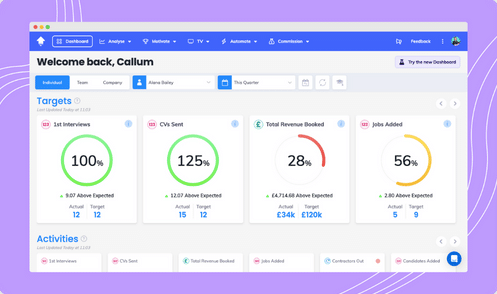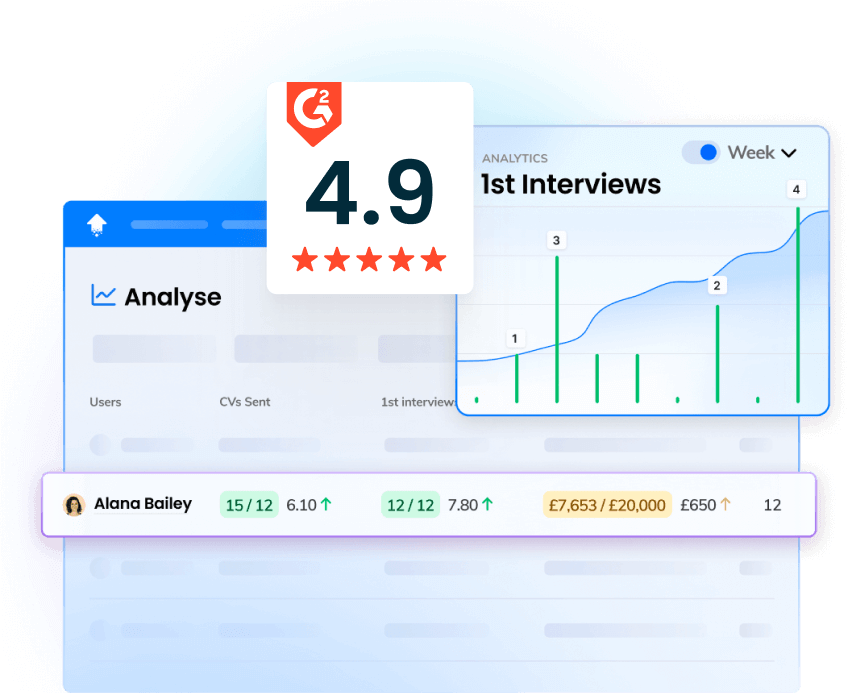Dealing with the day-to-day rush in recruitment agencies and managing a diverse team of recruiters isn’t easy. As a recruitment team manager, you're constantly faced with the challenge of ensuring that your team not only meets but exceeds its targets.
It's a tough job, keeping tabs on everyone and ensuring the entire team functions at its best.
This is where the importance of structured evaluation comes into play. Recognising that each recruiter brings a unique set of skills and performance levels to the table, it becomes crucial to have a system in place to assess and enhance their performance effectively. Whether it's identifying the high-flyers who deserve recognition or finding ways to uplift those struggling, a well-defined recruitment performance evaluation strategy is key.
In this blog, we'll guide you through methods to monitor and improve your recruitment team's performance.
We've got you covered from practical review templates to key metrics that shed light on performance. By the end of this journey, you'll be equipped with the tools and insights needed to elevate your team's productivity and continue making those winning hires.
The importance of recruiter performance reviews
In recruitment agencies, it's clear as day – recruiters are the ones growing the business. The agency's revenue takes a hit if they're not hitting the mark. That's why getting the absolute best out of every recruiter on the team is vital. And that’s where recruiter performance reviews come in.
Recruiter performance reviews are more than just a routine check-in. These reviews are crucial for recruitment team managers, especially since many of them started as recruiters and haven't had much training in leading a team.
Giving team managers solid tools for recruiter performance reviews is crucial. It's not just about spotting where things could be better; it's about empowering the team. With the right templates and structure, managers can help their team shine. And when the team shines, the agency's revenue soars. That's what it's all about.
What are recruiter performance reviews
Alright, so what's the deal with recruiter performance reviews? How to evaluate recruiter performance? Think of performance reviews as your go-to tool for figuring out how your recruiters have been doing and what you expect from them moving forward. It's like having a roadmap for their job, with two big goals in mind:
- For recruitment managers: it's all about taking a good, hard look at the team. Are they handling talent like pros? Are they keeping everyone pumped and focused? Do they get what opportunities are out there and what might be holding people back at work?
- For recruiters themselves: it's a chance to step back and ask, "Am I putting my energy in the right places?" It's about ensuring they're not just busy but doing stuff that matters.
And let's be real, recruiters are like anyone else – they're super keen to get feedback from their team lead and their colleagues. They're always looking for advice that can make them even better at spotting top talent and making those smart hiring choices.
So, in a nutshell, recruiter performance reviews aren't just some exercise. They're the secret sauce to ensuring your recruiters are on top of their game, and your company is bringing in the kind of people who'll help it soar.
Exploring different review templates
So, you're curious about different templates for recruiter reviews, right? Think of these templates like your favourite recipes – they've got all the ingredients you need, just add your flavour! Each template should have some key stuff, like info about the recruiter and a way to rate things like:
- Quality of work
- Accomplishments
- Work ethic
- Self-evaluation
Alright, let's check out some templates you can use, starting with the big one:
Annual recruiter performance review template
This one is like your annual check-up but for work. It takes a look back over the past year to see how your recruiter did. Did they nail their responsibilities? How much did they help reach those big goals and objectives you discussed last time? It's a great way to see the big picture of their progress and contributions.
Annual Recruiter Performance Review Template
Quarterly recruiter performance review example
Now, let's talk about the quarterly reviews. Picture these as your regular pit stops in the race of the work year. Every three months, you take a quick break and see how things are going. It's perfect because it's not just a once-a-year deal – you catch up more often.
These reviews are great for recruiters because they don't have to wait forever for feedback. They can get insights into what's working and what's not, and then make quick tweaks. It's all about staying on track to hit those big year-end targets.
Quarterly Recruiter Performance Review Template
Enhancing recruitment through feedback
Alright, we've talked about templates for keeping track of recruiter performance. Now, let's talk about something equally important – feedback. It's like moving from the structure of the templates to the art of communication.
This might shock, but 65% of recruiters want more feedback on their work. They're not just open to constructive criticism, they're asking for it! Why? Because it's key to keeping them engaged, motivated, and on top of their game.
But here's the thing – giving feedback isn't always a walk in the park. It's more challenging than others might think. You've got to be honest but not harsh. It's all about helping, not hurting. And let's be real, that can be tricky.
A little feedback can go a long way. Think of it as giving your recruiters a roadmap, highlighting all the shortcuts and scenic routes to success. Now, let's break down how to give feedback that's heard and acted upon.
Focus on the situation, not the person
Recruiters often pour their heart and soul into their work, so criticism can sting. That's why focusing on the situation, not the person, is super important. Talk about the issue as something that can be fixed, not a hit on the recruiter's skills.
Let’s say you've got a recruiter who jumps right into interviews without warming up to candidates. This could come off as cold or uncaring. Here’s what you might say:
"I've noticed you dive straight into interviews without much small talk. Taking a moment to connect on a personal level – like chatting about hobbies or where they live – can really help build a positive vibe with candidates. How about giving that a try?"
Make your feedback result-driven
Recruiters, like their managers, are all about results. So, frame your feedback to show how different actions can lead to better outcomes. For instance, if someone's interview style feels too brisk, point out how a more engaging approach could increase the chances of candidates saying 'yes' to the job offer.
This way, feedback isn’t just criticism – it's a roadmap to achieving more.
Be specific about the feedback
Vague feedback? Big no-no.
It's got to be clear and actionable. It's not just about pointing out where things went wrong; it's about offering concrete tips for doing better next time. A great trick is the 'sandwich technique'. Start with something positive, slide in the critique, and then cap it off with a suggestion for improvement. For example:
"I appreciate how you're always meeting deadlines and aiming high, but let's make sure it doesn’t compromise the quality of your work. If you need more time or a second pair of eyes on something, just shout out."
Transforming reviews into development plans
Now that we've unpacked how to give feedback, let's talk about what comes next. Because, let's face it, even the best feedback is nothing if it doesn't lead to real growth and change. And that's where we pivot from just reviewing performance to crafting development plans.
Here's a little secret: what sets top-notch recruiting organisations apart isn’t just fancy branding, the latest tools, or having a bunch of sourcing channels up their sleeves. No. It's about how well your recruiters take your feedback and turn it into action.
Think about it this way: if a performance review ends with just a 'good job' or an 'okay, whatever', it's like missing out on a big opportunity. The real deal is when you use those reviews to make a game plan for getting better – a plan that's focused on achieving performance goals.
Wondering how to make that happen? We're about to get into some easy steps to help turn those reviews into a winning game plan.
Create a development plan
Right after the review, it's time to make a game plan based on your discussion. This isn't one-size-fits-all – it's all about what each recruiter needs and wants in their career. Break down big strategic goals into smaller, doable steps.
Get them what they need
Give your recruiters the tools they need to grow, like providing training, mentors, or workshops. Even if the budget's tight, you can get creative with things like team learning or online courses.
Keep the conversation going
Set up regular one-on-one chats to see how things are going. This keeps the plan fresh and flexible, making sure it's still on point.
Celebrate the wins
When your recruiters hit a milestone, make some noise about it! It's a big deal. Celebrating these moments boosts their spirits and keeps them motivated.
Align with career pathways
Make sure the plan lines up with where they want to go in their careers. This shows you're serious about helping them climb the ladder.
Learn from each other
Encourage your recruiters to share tips and tricks. It's a great way for the team to learn and get better together.
Align goals with business strategy
Last but not least, make sure the goals in the plan help move the whole business forward. This way, everyone's growth adds up to something bigger for the company.
How tools like OneUp can make a huge difference
Now that we’ve laid out how to create a development plan, let’s talk about the recruitment tools that can bring these plans to life. It's one thing to have a plan, but another to have the right tools to execute it. This is where something like OneUp can shine.

In recruitment agencies, teams often struggle with outdated CRM systems, boring spreadsheets, and complex analytical tools that eat up time and energy. Getting a clear view of performance can be a real headache. That’s exactly where a specialised tool like OneUp steps in.
OneUp isn’t just any recruitment tool; it’s designed to make the whole recruitment analytics process a breeze, fostering self-management and accountability within teams. It's all about keeping everyone in the loop about their targets and their progress in hitting them. With OneUp recruitment software, your recruitment agency:
- Build personalised dashboards: they can set up dashboards that focus on the metrics that matter to them and their roles.
- Host impactful meetings: be it one-on-one sessions or team huddles, they're all based on the latest updates on their targets.
- Monitor performance in real-time: say goodbye to waiting for monthly reports, OneUp allows for instant performance reviews.
- Define clear goals: it helps your recruiters stay focused on the important metrics by setting specific challenges and objectives.
So, by integrating a tool like OneUp, your recruitment team doesn't just have a plan – they have a powerful ally to help them stay on track and grow.
Preparing for a Recruiter Performance Review: Best Practices
Now that we've seen how tools like OneUp can revolutionise recruitment, it's time to shift our focus to actually conducting a recruiter performance review. Remember, these reviews aren't just about looking back; they're about sparking meaningful conversations and setting the stage for future success. Both recruiters and their managers need to come prepared to make the most out of these reviews.
Here is how you can prepare efficiently:
For recruitment managers
- Set clear objectives: what's the goal of this review? Is it assessing progress, giving feedback, or setting targets for the upcoming year? Outline what you'll cover, like the recruiter's self-assessment, and feedback from colleagues, and identify areas for improvement, and performance expectations.
- Prepare questions and examples: think ahead about what your recruiter might ask. Come armed with specific examples and data, like the number of successful hires or retention rates, to back up your points.
- Offer actionable feedback: be clear and specific about areas needing improvement and suggest practical steps for enhancement.
- Notify in advance: don’t spring this on your recruiter. Give them a heads-up about the review's objectives and ask them to prepare accordingly. This way, they can come ready to discuss employee performance and goals.
For recruiters
- Highlight your wins: talk about your biggest achievements and the strengths you leveraged to get there. Back it up with data like the number of hires, cost per hire, and time to fill. And as you already know, it’s easier to back your wins with data if you’re using tools like OneUp.
- Prepare your questions: show you're invested in your growth. Ask about improving performance, contributing to company goals, or your career development.
- Reflect on your hires: the success of your hires is a reflection of your work. Discuss metrics like internal feedback, turnover rate, project success, and employee NPS to showcase the value you bring.
Bringing it all together
So, after diving deep into how to measure recruiter performance, what's the big picture? Well, it's all about nailing the feedback – giving your recruiters the guidance they need to up their game. And remember, one size doesn't fit all. Each recruiter's development plan should be as unique as they are, tailored to help them grow just right.
Then there's the tech side of things. Bringing in a tool like OneUp can be a total game-changer, making it way easier to keep track of all that data without getting lost.
And at the end of the day, it's the data that tells the story. It’s about making choices that aren’t just based on gut feelings but on real, hard facts. That’s the secret sauce to making your recruitment process not just good, but great.




